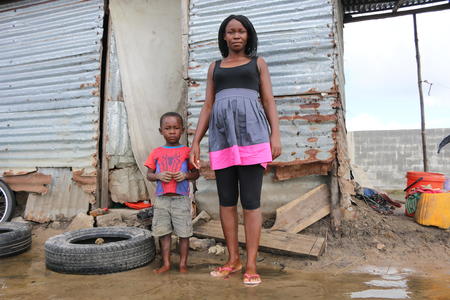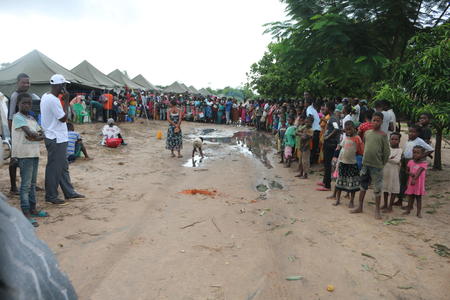WaterAid responds to Cyclone Idai flooding in Mozambique and Malawi
Updated May 1, 2019 — We are waiting to hear updates from our team in Mozambique after Cyclone Kenneth made landfall. We will update with more information when we have it.
Updated April 3, 2019 — WaterAid has joined emergency relief operations in the Zambezia region of Mozambique and in Zomba district in Malawi, where heavy rains and flooding have washed out bridges, made many roads impassable, and driven thousands of people out of their homes into temporary camps where clean water is scarce and toilets almost nonexistent.
Cylone Idai has affected nearly three million people across Mozambique, Zimbabwe and Malawi. The heavy rains and flooding have made hundreds of thousands homeless, and waterborne diseases like cholera pose great risk.
WaterAid is not an emergency response organization. However, when disasters affect the communities we work with directly, and when our local partners on the ground are ready and able, we take action.
In both countries, we will work with partner organizations to ensure emergency provision of safe water and decent community toilets in temporary camps for displaced people, and distribute hygiene kits including soap, water buckets and purification tablets, toothbrushes and toothpaste, and menstrual hygiene materials.
“We don’t have anything here," says 24-year-old Zaida Eduardo, a mother of two boys in Quelimane, Mozambique. Zaida's youngest son, Sergio Mário, contracted malaria and is at risk of further illness, since the family is without access to clean water or a hygienic toilet.
It’s very sad and difficult to live here. Our situation is complicated because nobody sees us. There is no water, hygiene or sanitary conditions.
As a development agency, WaterAid will remain in these countries for the long-term, helping communities rebuild and repair water points and toilets.
Even before this disaster, 53% of people in Mozambique, and 33% of people in Malawi did not have access to clean water close to home, while three-quarters of people in Mozambique and more than half of people in Malawi did not have access to a decent, private toilet.
We know that as climate change takes hold, these extreme weather shocks will worsen in frequency and scale. We are also working with national governments and at the international level to ensure that financing and support for climate adaptation and disaster preparedness and recovery are put in place, to help communities and countries recover after such devastating events.
What is WaterAid doing?
In Mozambique:
WaterAid worked in Zambezia region for more than a decade and has begun a relief operation working with partners to ensure emergency provision of safe water and decent community toilets in temporary camps for displaced people. We are also supplying hygiene and dignity kits, water purification tablets and mosquito nets to more than 7,000 people.
In Malawi:
In Malawi we are working with partner organisations and local authorities to test water quality, and to disinfect and restore water points and water systems.
After the initial relief operation, we will remain in the area to support families to rebuild their lives and livelihoods with the restoration of vital water, sanitation and hygiene services.
//ends//
Donate to Cyclone Idai relief efforts
Photo gallery: https://wateraid.assetbank-server.com/assetbank-wateraid/images/assetbox/e8de2a73-ba5e-43e1-bad1-0f7df9fcbbe6/assetbox.html
For more information, please contact:
In the US: Emily Haile, Senior Communications and Media Manager, [email protected]





